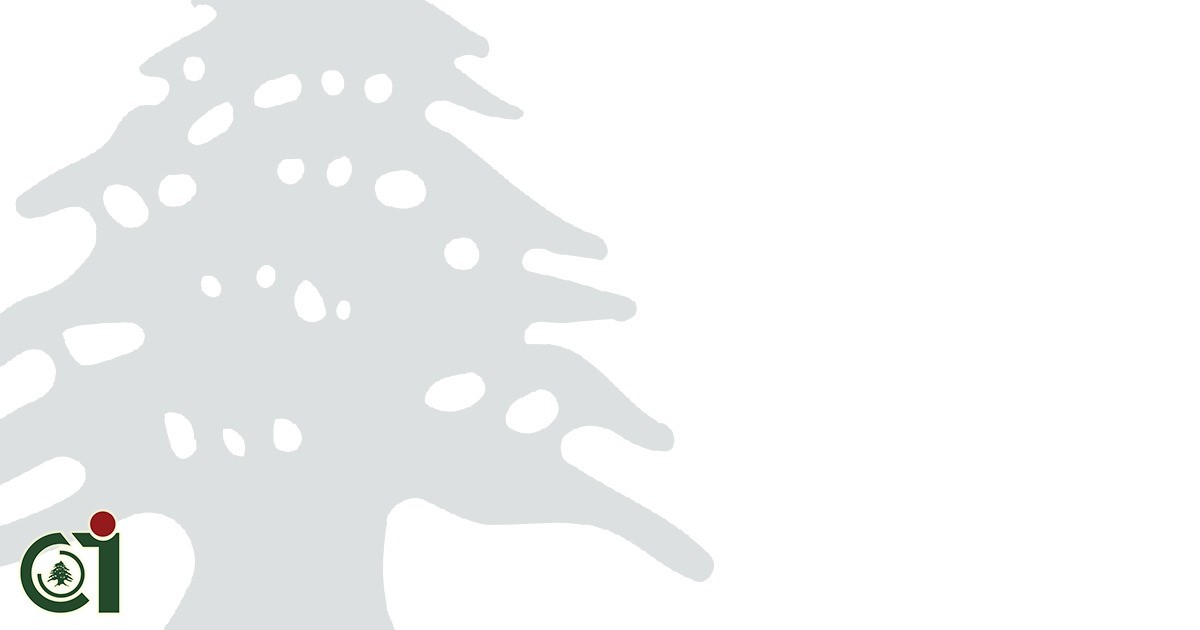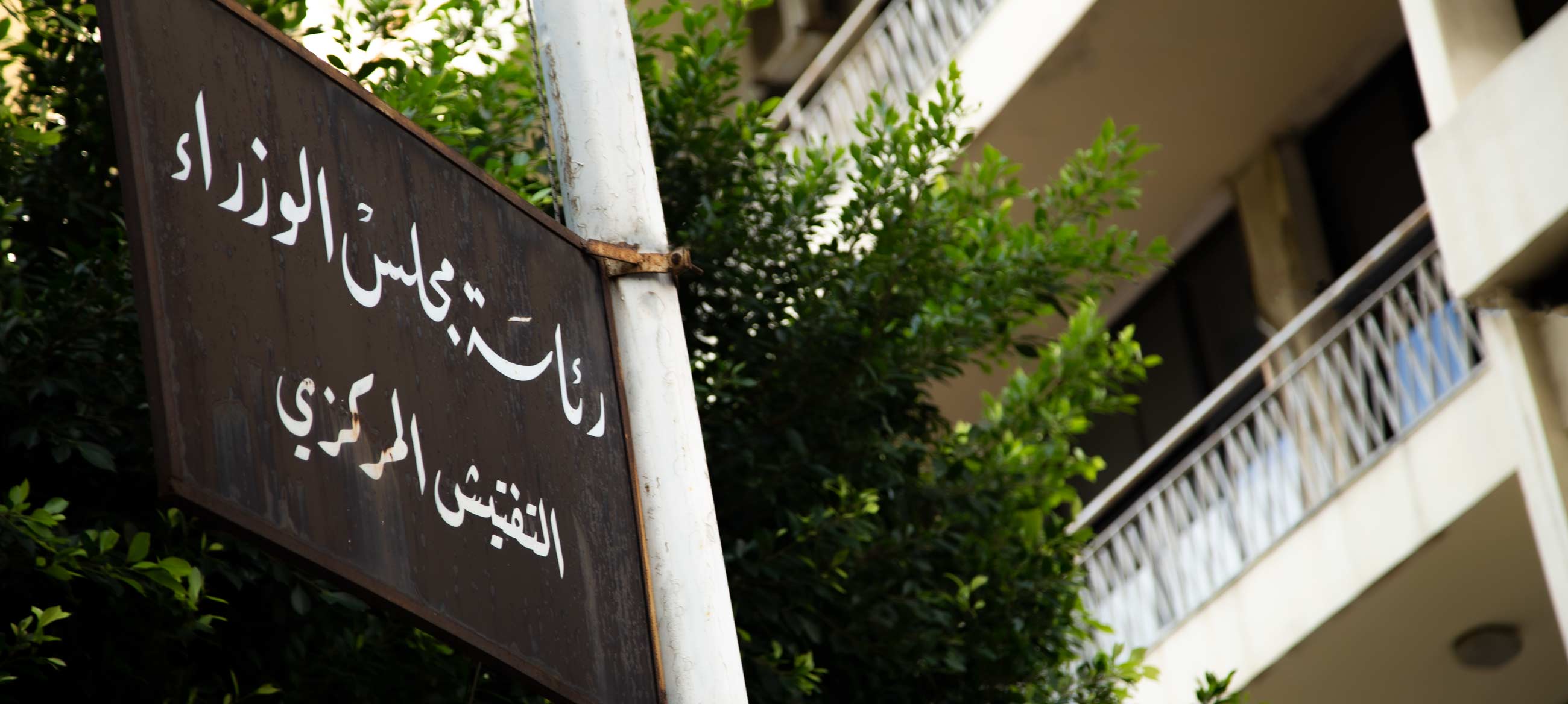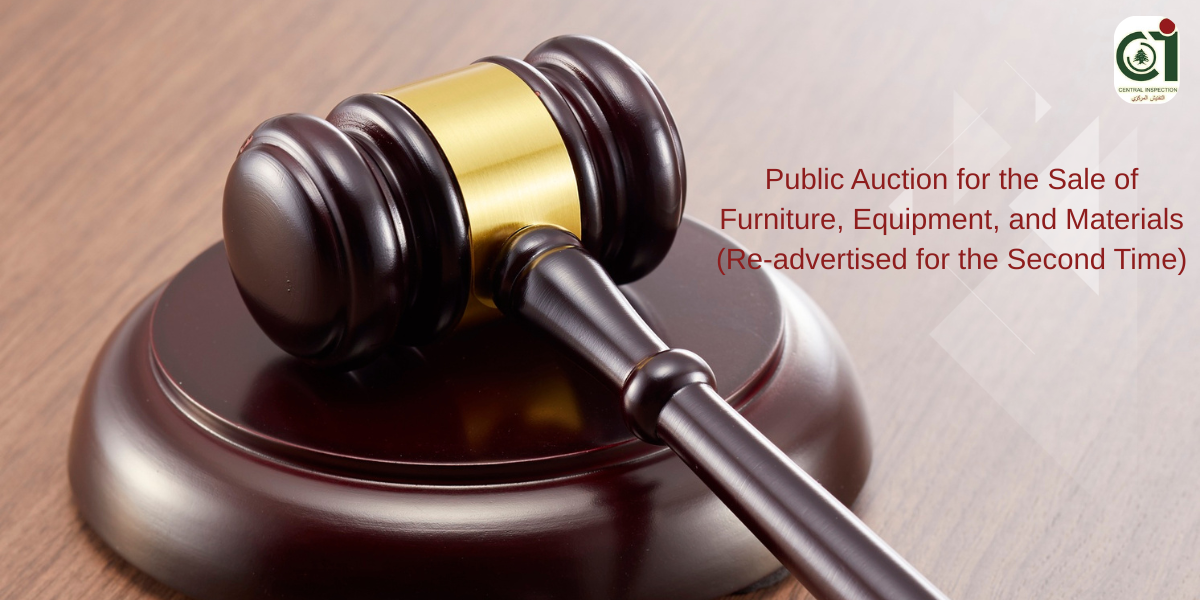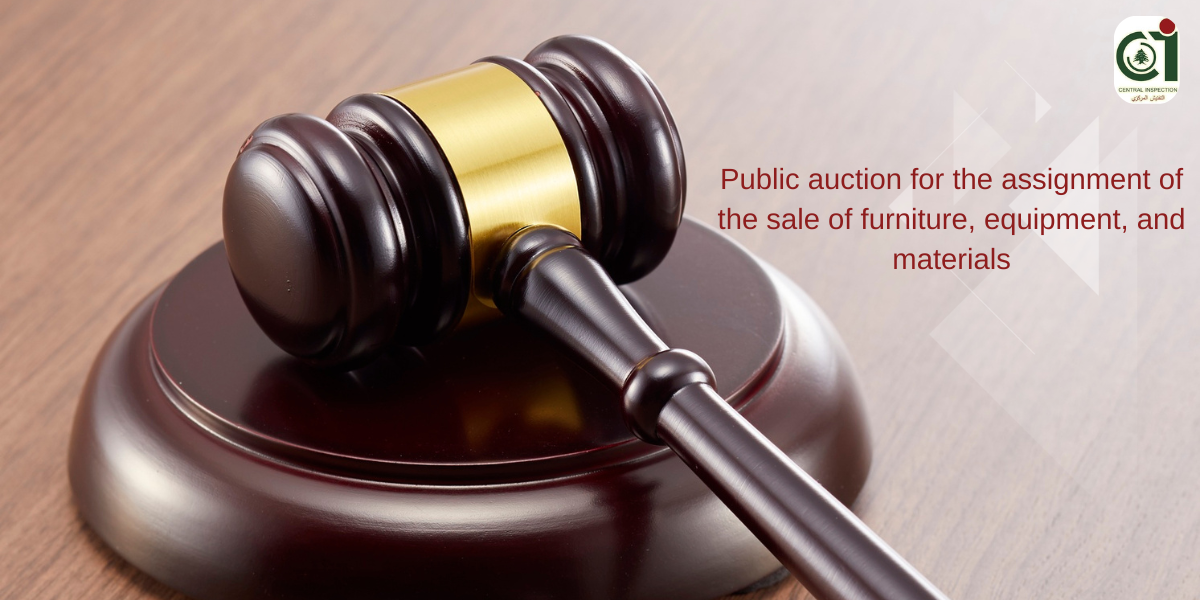Individuals can file complaints or claims to the Central Inspection against administrations falling within its remit, or against the employees or workers of these administrations, for investigation and establishment of facts.

THE SWAMP AND THE FRESH AIR
Judge Georges Auguste Attieh
December 9, 2020
“Corruption exists in the very air we breathe…”
On the International Anti-Corruption Day, I cannot think of a better saying than that of Naguib Mahfouz to sum up Lebanon’s current situation, as corruption continues to plague its administrations and institutions. Lebanon ranked 137th out of a total of 180 countries on Transparency International’s Corruption Perceptions Index. Our country has a long history of corruption. In most cases, we either outright denied the presence of corruption or simply condemned it. At times, we recognized its presence a little too late. But more often, we allowed it to occur with impunity. Even in cases where corruption was exposed, no measures were taken to punish the corrupt or to deter them from committing similar acts in the future.
Numerous studies have been written on corruption in Lebanon, with recommendations on how to fight it. Most of these studies trace corruption back to the sectarian power-sharing system. Various newspapers and media outlets have also published reports exposing corruption and naming corrupt officials in different sectors, but there was never a sufficient level of accountability commensurate with the severity of the crimes committed.
Today, I turn to the Lebanese citizens to stress that we cannot wage a war against corruption without first halting its spread. By doing so, our aim would be to lay down the principles of good governance in public administration, which primarily include accountability, transparency and the rule of law, in parallel with enhancing the central role of oversight bodies. Since its establishment during the era of President Fouad Chehab, the Central Inspection has been practicing oversight on public administrations and institutions, auditing their work and detecting flaws therein, with the purpose of developing the methods of administrative work. This is evidenced by the many reports and decisions that have been issued, which have uncovered corruption and illegal practices. However, the law makes it necessary to keep these decisions confidential and not to disclose their details.
Without prejudice to the principles of confidentiality and privacy, which ensure the proper fulfilment of our inspection duties, we have managed to gain cumulative experiences, learn 2 lessons, derive the sound principles of institutional work and develop the performance of public administrations. We have stressed time and again the need to abide by the decisions issued by competent administrative and judicial oversight bodies. Based on our follow-up of several cases, we have come to the conclusion that ministers must be subject to the normal judiciary, rather than the Supreme Council for Trying Presidents and Ministers, in order to avoid any bias or discretionary tendencies during such trials.
On the occasion of the International Anti-Corruption Day, we reiterate the need to subject all public sector bodies and persons, without exception, to the powers of the Central Inspection, as we can no longer fight corruption if certain institutions and administrations continue to operate without any form of oversight.
It is true that corruption exists in the very air we breathe. The question that Mahfouz posed is still relevant in our case: How can any glimmer of hope come out from the swamp we are in? That is why we will present to you, in the coming days, a roadmap for administrative reform that proposes some key practical steps to guide the work of institutions and administrations. This plan could serve as a way to climb out of the abyss and to overcome the scourge of corruption, which is paralyzing the entire country and its administrations. In this context, the oversight work of the Central Inspection must be activated, and there should be a higher level of compliance with its decisions, as these latter constitute the foundation of administrative reform in the Lebanese Republic and the basis of regaining the trust of the Lebanese people and international partners in state institutions.
The plan also lays out the Central Inspection’s vision with regard to several sectors, based on the experience of inspectors in various fields and on data collected throughout years of oversight work, during which inspectors gained a broad understanding of the Lebanese public administration. In addition to that, the plan includes a series of reforms that seek to enhance the effectiveness of administrative work and reduce corruption, particularly in terms of the functions of ministers, as well as activate oversight bodies and transition into digital governance.
In short, the most prominent of these reforms include the following:
1. Reorganize the functions of ministers: Ministers should follow the right administrative hierarchy in administering ministerial functions. Current and former ministers should be subject to ordinary courts rather than the Supreme Council for the Trial of Presidents and Ministers.
2. Rationalize and activate administrations: Certain ministries should be abolished (Ministry of Information, Ministry of the Displaced) or merged together (Ministry of Youth and Sports, Ministry of Labor, Ministry of Culture, Ministry of Social Affairs). The structures of ministries should also be reconsidered, reducing the number of jobs and adopting new organizational structures that go in line with the developing concept of public administration.
3. Strengthen oversight authorities and upgrade their tools: Civil servants should be obligated to directly report any legal violations or breaches they observe as they discharge their duties to the Central Inspection, even if the paper they are processing has been endorsed or sanctioned by their superior or the higher authority.
4. Transition to digital administration: All public sector departments and oversight authorities should be linked digitally. All paperwork should be automated and completed in a decentralized manner.
5. Standardize employment criteria and administration structuring: All professional violations and abuses in recruiting for leadership positions (the illegal practice of assignment by appointment) should be ceased. Such practices have undermined job stability and led a de facto situation of dependency where employees are left at the mercy of their superiors.
6. Enforce internal audit: Internal audit should be observed in all ministries, administrations, public institutions, municipalities, as well as all other public sector agencies. A copy of audit reports should be mandatorily sent to the competent oversight authorities.
7. Standardize and streamline paperwork procedures in public administrations: Administrative processes should be streamlined. Rules and procedures of completing paperwork and formalities should be properly defined. Roles and functions of employees should be clearly set. Clear and known procedures should be adopted for all the functions assumed by public sector departments (e.g., paperwork/formalities, required documents, workflows, deadlines for completion, etc.)
8. On administrative work: Employees should develop a written action plan for each assignment, including objectives, scope, timelines, and relevant resources. The plan should take into consideration the administration’s strategies, objectives and risks relevant to the assignment.
9. On the Ministry of Environment: An effort should be made to set the necessary standards, indicators and conditions for the classification of consultancies in charge of conducting strategic, environmental assessments, environmental impact assessments, initial environmental examinations and environmental reviews as per paragraph (7) of Article 27 of Decree 2275/2009. It also necessary to define the qualifying classification conditions of such consultancies.
10. On the Ministry of Telecommunications: Law No. 431 of 22/7/2002 should be put in force as it has not been enforced since its issuance. This has resulted in losing fulltime staff while failing to appoint employees to fill vacancies. It also gave rise to power overlapping between Ogero and the Ministry of Telecommunications. Also, as a result, the Telecommunications Company of Lebanon (Liban Telecom) did not see the light of the day.
11. On the Ministry of Public Health: The Ministry should be reorganized and restructured, with more emphasis being given to competence and qualifications for jobs requiring specific specialization. Also, there should be a focus on creating a control or oversight system over public hospitals, where pricing structures and hospitalization classifications are unified for all beneficiaries equally.
12. On the contracting practices of the Ministry of Public Works and other administrations: A serious effort should be made to stop the illegal practice of partitioning procurement. Under such practice, tenders for certain works are launched in such a way that partitions stages of work unreasonably simply to evade the control of the Court of Audit and to escape the control of the Tenders Directorate and the Central Inspection.
13. On the Ministry of Social Affairs: Efforts should be deployed towards activating the use of the social card for the people with limited income and the poorest households.
14. On the Ministry of Agriculture: Municipalities should cooperate with agricultural and livestock centers in an effort to map state-owned agricultural lands and arable commons, as well as determining the number of farmers, their names, and their roles (owners, reclaimers, workers, etc.). The purpose is to devise a strategy for food security and a balanced food basket.
15. On the Ministry of Finance: A survey should be conducted to map all income taxpayers to prevent tax evasion. Also, there should be a focus on revisiting income tax brackets under chapter two, as it is illogical that middle-wage earners pay more tax than most taxpaying enterprises. In addition, due taxes and duties due should be collected, and mandatory collection should be observed as soon as the current difficult circumstances are over as the percentage of collected taxes is very little compared to what it should be.
16. On customs: Harsher sanctions should be imposed on parties in charge of customs clearance in the event of repeated violations in providing customs information. Advanced scanning machines “robotic scanners” should be provided in adequate numbers and distributed across all border entries (ports, airport, land border crossings). This will enable and easy and quick inspection of imported goods and will reduce risks of tampering and fraud, which could occur during the inspections process. In addition, scanning IT systems will ensure the smooth flow of goods into Lebanese territories.
17. On Electricité du Liban (EDL): A serious effort should be deployed to stop the technical waste and the waste resulting from cases of electricity theft, and to process those subscription applications that have been stuck in drawers for years now. The KWH rate for higher brackets should be increased with no impact on the poor as the current KWH rate is significantly lower than the cost, thus leading to an increased deficit at EDL.
18. On public administrations, municipalities and municipal unions: All legal texts that exempt the municipal decision-making and executive authorities from the Central Inspection's remit should be abolished. Additionally, the referral of those officials to the higher disciplinary board should be left to the oversight authorities rather than the Ministry of Interior.
19. On good governance: The performance evaluation system in some departments should be properly enforced. A new valuation system should be developed taking into consideration the development of administrative functions and the means and methods of their implementation.
20. On organizational assessment and performance indicators: The Central Inspection should be given the authority to run a database that is updated regularly with data sent by different administrations. The CI should be mandated as well to process and analyze data to identify the gaps and shortcomings in each administration and propose ways to address them based on their nature, either though inspectors or through recommendations submitted to administrations, officials and the Parliament.
21. On risk analysis: The Central Inspection should introduce a new evaluation system that all administrations apply annually to evaluate their situation and the risks at stake and put down a plan to avoid them.
22. On the status of inspectors in the Central Inspection: The financial and legal status of inspectors should be improved in a manner consistent with the tasks assigned to them and they should be provided with the necessary legal immunity, the Central Inspection should also be given the authority to subject unproductive inspectors to evaluation, reexamine their competence and refer them back to the Civil Service Board in to have their employment status reassessed.
23. On the imposition of harsher sanctions by the Central Inspection: Article 55 of the Civil Servants’ System should be amended by adding to it deterrent penalties. Amongst the proposed sanctions is the disciplinary transfer that the Central Inspection board should be authorized to impose.
24. On the mandate of the Central Inspection: Expand the Central Inspection’s mandate to cover all administrations, public institutions and municipalities, along with all those involved in public affairs and public funds.
25. On the work of inspectors: The Central Inspection should be given the legal tools needed to compel administrations to cooperate with it, provide it with the required documents, and facilitate the access of inspectors without hampering their work.
26. On the legal pursuit of private funds: As part of combatting attempts at public funds, serious efforts should be exerted to legalize the legal pursuit of private funds, whenever an indictment has been issued by the Central Inspection.
27. On the coordination between administrations: The Inter-Municipal Platform for Assessment Coordination and Tracking (IMPACT) should be reinforced, this platform being the first experience in Lebanon to link municipalities with central authorities and to collect accurate data in order to develop policies that respond to actual needs and address challenges through the latest digital technologies.
The above are some of the recommendations that will be presented by the Central Inspection as part of its roadmap for administrative reform, which will be published before the end of this year. On the International Anti-Corruption Day, we can only say that the time is ripe to rebuild the State and its institutions and to utilize the capacities and skills of public servants, who are the key drivers of change. That is our only way out of the “swamp” of corruption into the fresh “air” of good governance.







 Facebook
Facebook Instagram
Instagram Youtube
Youtube Twitter
Twitter